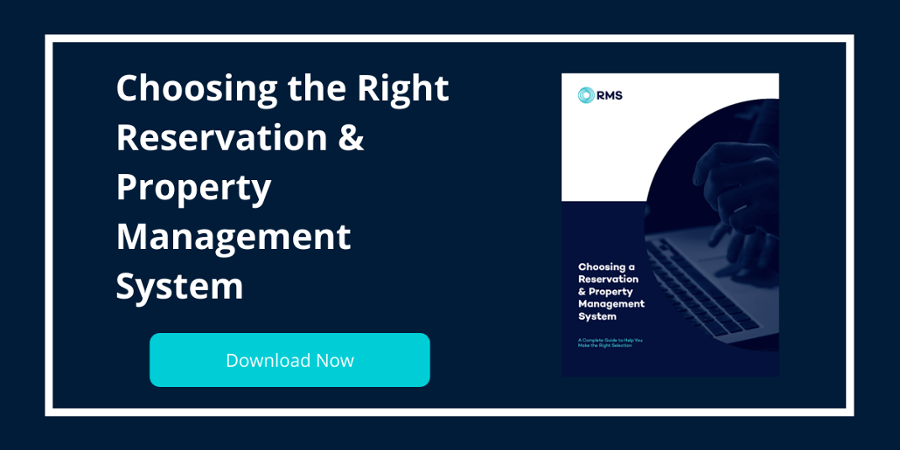The day has finally come… the time to switch your hotel propertymanagement system (PMS).
You may have begun casually vetting PMS choices, but the urgency is rising— with the limitations of your current system now impossible to ignore.
But before you make your decision, there are some crucial questions you need to be answered.
Here are five considerations when comparing hotel management systems:
1. “What is the true cost of the platform for what I need it to do?”
This is usually everyone’s first question, right? “How much is the transition really going to cost me?”
Begin your conversations with PMS vendors with an ideal budget in mind. To estimate your price point, look at what you’re currently spending on the old PMS and your forecasted growth. Consider the PMS’s monthly costs, the onboarding fees, additional support, and training time. Challenge yourself to consider (and ask about) other hidden costs.
Then, think of all the ways a new PMS could save you money by improving efficiency. The more “set it and forget it” features your new PMS provides, the more efficient your properties can be. For example, one cost for hoteliers is juggling channel managers. The right PMS could compile your channels into a single, automatically updated space.
While it may be tempting to explore a system out of your financial comfort zone to see all the shiny bells and whistles, you ultimately want a solution you can afford for years to come— so make sure it’s within your means and don’t overextend.
If you have a little wiggle room in your PMS budget, start at the lower end of the pricing ladder and work your way up. As you add more features and integrations to the original solution, the cost is sure to rise.
2. “How often do you release updates?”
Technology is ever-evolving, and a hotel property management system that remains the same year after year will simply hold you back.
If the answer to how frequently they roll out PMS updates is “not that often,” that’s a big indicator you’ll face stagnation in platform improvements, which could translate to stagnant growth for your business at large.
Similarly, if they give you a vague answer, like “we update our PMS as needed,” ask follow-up questions to get a clear picture of what that means. Try to get a sense of how invested the software is in receiving feedback from users and addressing it in a timely manner— and don’t be afraid to use this topic as a segway to the PMS vendor’s customer support offerings.
3. “How can I use this platform to improve my guest experience and communication?”
Almost everything you do revolves around two words: guest experience. Does the PMS offer a built-in booking engine and connect all channel manager data? What about a portal for guests to manage their reservations, receive notifications related to their stay, make payments, etc.? Is self-service available for guests or mobile check-in/check-out and kiosk integrations? Does it enable SMS messaging as an easy line of communication to remind guests of their stay and encourage them to leave positive reviews?
End with an open-ended question that allows the property management software provider to tell you about more features you hadn’t addressed. Say, “How will your platform let me learn more about my guests and retain that information for nurturing?” and see if the vendor is thinking about your long-term relationship with guests.
4. “Can I customize reporting? And will it work cross-platform?”
Some PMS systems only come with out-of-the-box reporting that doesn’t allow for the flexibility you need. While the system may offer daily scheduled arrivals/departures reports or monthly financials, a hotel management software that limits customization could be limiting important insights that enable your growth.
Don’t just ask if they allow custom reporting, see if they could show you or let you play with the tool to see if it can do what you need it to do. You also want to ensure that the integrations you currently use can be factored into the reporting, for a holistic view.
5. “Will this system still work as my business grows?”
Whether you are a single hotel, a few-property network looking to expand, or a large multi-property entity, you want a solution that will not only help you grow now— but one that will scale. In conversations with PMS vendors, inquire about the types and sizes of properties they service. If they mention that they service properties only to a certain size, perhaps that may not be the right move for you depending on your growth potential.
Ask yourself, “Will this PMS align with my 5-year plan? How about my 8?” We all know how time-consuming and burdensome it is to switch property management software. You don’t want to migrate everything and train your entire team on the new platform only to start from the ground up a year or two later.
See What’s Different with RMS...
Because switching to a new hotel property management system is such a time-consuming process, you want to get it right the first time.
What you need is an all-in-one solution: one that offers a suite of add-on modules to grow with your property and meet your specific needs. Not only should it be a PMS, channel manager, and booking engine, it should also offer or integrate housekeeping, staff communication, POS, asset maintenance, guest marketing, and event management— just to name a few— so all your future needs can be met and exceeded.
Download the Choosing the Right Reservation & Property Management System to learn more.






